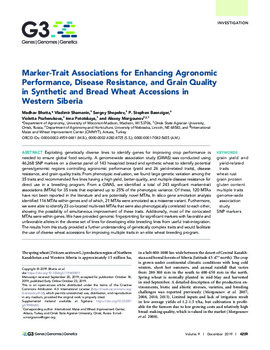Mostrar el registro sencillo del ítem
Marker-trait associations for enhancing agronomic performance, disease resistance, and grain quality in synthetic and bread wheat accessions in Western Siberia
| Autor: | Bhatta, M.R. |
| Autor: | Shamanin, V. |
| Autor: | Shepelev, S.S. |
| Autor: | Baenziger, P.S. |
| Autor: | Pozherukova, V.E. |
| Autor: | Pototskaya, I.V. |
| Autor: | Morgounov, A.I. |
| Año: | 2019 |
| ISSN: | 2160-1836 (Print) |
| URI: | https://hdl.handle.net/10883/20601 |
| Formato: | |
| Lenguaje: | English |
| Editor: | Genetics Society of America |
| Copyright: | CIMMYT manages Intellectual Assets as International Public Goods. The user is free to download, print, store and share this work. In case you want to translate or create any other derivative work and share or distribute such translation/derivative work, please contact CIMMYT-Knowledge-Center@cgiar.org indicating the work you want to use and the kind of use you intend; CIMMYT will contact you with the suitable license for that purpose. |
| Tipo: | Article |
| Lugar de publicación: | Bethesda, MD (USA) |
| Páginas: | 4209-4222 |
| Número: | 12 |
| Volumen: | 9 |
| DOI: | 10.1534/g3.119.400811 |
| Descripción: | Exploiting genetically diverse lines to identify genes for improving crop performance is needed to ensure global food security. A genome-wide association study (GWAS) was conducted using 46,268 SNP markers on a diverse panel of 143 hexaploid bread and synthetic wheat to identify potential genes/genomic regions controlling agronomic performance (yield and 26 yield-related traits), disease resistance, and grain quality traits. From phenotypic evaluation, we found large genetic variation among the 35 traits and recommended five lines having a high yield, better quality, and multiple disease resistance for direct use in a breeding program. From a GWAS, we identified a total of 243 significant marker-trait associations (MTAs) for 35 traits that explained up to 25% of the phenotypic variance. Of these, 120 MTAs have not been reported in the literature and are potentially novel MTAs. In silico gene annotation analysis identified 116 MTAs within genes and of which, 21 MTAs were annotated as a missense variant. Furthermore, we were able to identify 23 co-located multi-trait MTAs that were also phenotypically correlated to each other, showing the possibility of simultaneous improvement of these traits. Additionally, most of the co-located MTAs were within genes. We have provided genomic fingerprinting for significant markers with favorable and unfavorable alleles in the diverse set of lines for developing elite breeding lines from useful trait-integration. The results from this study provided a further understanding of genetically complex traits and would facilitate the use of diverse wheat accessions for improving multiple traits in an elite wheat breeding program. |
| Agrovoc: | YIELDS |
| Agrovoc: | GRAIN |
| Agrovoc: | WHEAT |
| Agrovoc: | RUSTS |
| Agrovoc: | GLUTEN |
| Agrovoc: | AGRONOMIC CHARACTERS |
| Agrovoc: | GENOMES |
| Datasets relacionados: | https://gsajournals.figshare.com/s/6434bc736b63a242e546 |
| Datasets relacionados: | https://doi.org/10.25387/g3.9943682 |
| Revista: | G3: Genes, Genomes, Genetics |
Ficheros en el ítem
Este ítem aparece en la(s) siguiente(s) colección(ones)
-
Wheat
Wheat - breeding, phytopathology, physiology, quality, biotech

